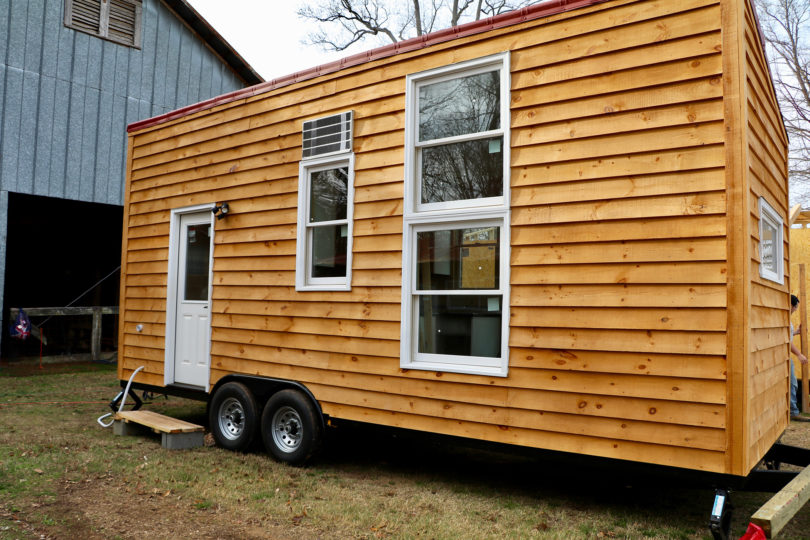Athens, Ga. – It’s only 175 square feet, but it’s cozy, clean and makes all the difference in the world to a young farmer who is learning to work the land.
It’s a tiny house built by students taking a University of Georgia sustainable building course and donated to a Georgia farmer as part of Georgia Organics’ organizational push for farmer prosperity.
Rabun County farmer Terri Jagger Blincoe of Ladybug Farms in Clayton received the keys to the tiny house in a ceremony Saturday, Feb. 18, at Georgia Organics’ 20th annual conference in Atlanta. The house will be delivered to the farm the first week of March during UGA’s spring break.
This is the second tiny house that UGA students have donated to a Georgia farmer through Georgia Organics. “Green Building and the Tiny House Movement,” a course offered jointly through the College of Agricultural and Environmental Sciences and the College of Family and Consumer Sciences, launched in fall 2015.
During the class, which is co-taught by FACS assistant professor Kim Skobba, housing management and policy department, and CAES associate professor David Berle, of the horticulture department, students learn about land planning and building code issues facing American cities. They also design and build a tiny house. Georgia Organics helps to fund the construction, then selects a farmer to receive the house, one who pledges to use the house to help train a younger farmer.
“This project would not happen without UGA and their sustainable building class, who designed and built the tiny house,” said Alice Rolls, executive director of Georgia Organics. “We give a valuable asset to a farmer, but it’s also an amazing educational opportunity for students to learn sustainable design.”
A Georgia Organics selection committee received several applications from farmers interested in receiving the tiny house. The farmers wrote essays explaining how they would use the house if they were to win.
Blincoe stood out because she was an established farmer with a history of hosting younger, apprentice farmers, Berle said.
Ladybug Farms distributes produce to restaurants around metro Atlanta and through a community-supported agriculture program in Atlanta’s Cabbagetown neighborhood. The farm is also active in the Northeast Georgia Farm to School program and serves as an apprenticeship site for UGA’s Journeyman Farmer Certificate Program.
“They have a unique outreach model that fit well with our purposes and with those of Georgia Organics,” Berle said.
Tiny houses enable young people to learn how to farm from older farmers or even to start farming because they solve a critical problem-the lack of on-farm housing, Berle said.
“There’s a need on many farms for housing, especially for young farmers, for interns, for apprentices,” Berle said. “There are a lot of people who are willing to share their knowledge, but [there is] not always a place for apprentices to live. And in many cases, there are farms that people would let a young farmer use, but the owners are still living in the farmhouse. Building a tiny house fills that need.”
For more information about the sustainable building class’s latest project – a trailer-based catering kitchen and accessible bathroom for use at UGArden – visit tinydawghouse.com. This latest project will be built with lumber cut on site from storm-damaged trees.








